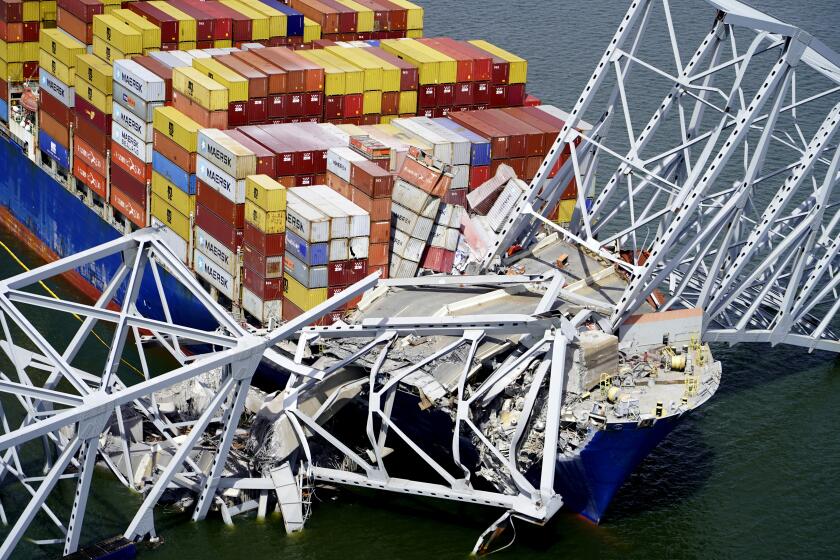North Korean arms seizure could be a boost for nuclear talks
The recent seizure of a transport plane carrying North Korean-made weapons for sale was more than just an embarrassment for Pyongyang. It represents another significant loss the financially struggling regime can ill afford, analysts here say.
An anemic North Korean economy has continued a perilous tailspin in recent months triggered by international sanctions imposed on the combative nuclear-armed state. The United Nations-imposed restrictions have led to several risky measures that experts suggest may be warning signs of worsening economic woes.
Days after North Korean officials signaled that they were considering a return to the stalled six-party nuclear talks, the regime apparently sanctioned the departure of a transport plane loaded with an estimated $18 million of weapons that authorities believe were destined for Iran.
The plane was seized last week as it refueled in Thailand.
The regime also has faced widespread public anger at home over its move this month to revalue the national currency, making a 10,000-won note worth 10 won. A recent newsletter of the Seoul-based aid group Good Friends reported that authorities publicly executed a man after he burned a pile of currency.
The discontent led officials to ease the devaluation, which was aimed at curbing runaway inflation.
Analysts say North Korea’s need to bolster its weakened economy may be the leverage needed to bring its leader, Kim Jong Il, back to talks designed to persuade the regime to give up its nuclear arsenal.
“The U.N. embargo has had an effect,” said Choi Soo-young, a senior research fellow at the Korea Institute for National Unification in Seoul. “The plane detained in Thailand will have a big impact. It shows North Korea’s illegal air trade has been restricted. It is very difficult for the regime to make money.”
Pyongyang’s struggles will depend on just how much China -- its longtime communist ally and biggest benefactor -- will follow through in its promise of continued economic help.
In a visit to Seoul on Thursday, Chinese Vice President Xi Jinping called on North Korea to resume the long-stalled talks, which include the United States, Russia, China, Japan and South Korea.
Analysts say they do not know how much longer the North Koreans can rely on Chinese aid if they ignore such pleas. “China’s help has allowed North Korea to stay un-swayed,” Choi said.
During a recent visit to North Korea by U.S. special envoy Stephen Bosworth, officials there demanded that U.N. sanctions be lifted, according to the South Korean Yonhap news service, citing an unidentified diplomatic source.
The U.N. Security Council imposed stricter sanctions in June after North Korea conducted an underground nuclear test, its second in three years. The embargo seeks to ban Kim’s regime from developing its nuclear program and selling conventional arms.
U.S. officials have pressed the international community for strict implementation of the sanctions and have targeted firms they suspect of aiding North Korea’s arms sales.
With an estimated annual gross domestic product of $17 billion, North Korea is believed to earn as much as $1 billion annually by selling missiles, missile parts and other weaponry to nations such as Iran, Syria and Myanmar, also known as Burma.
“To reduce North Korea’s economic suffering, support and resources from the outside world are essential,” said Cho Myung-chul, a North Korean economist at the Korea Institute for International Economic Policy in Seoul.
He said that North Korea’s economy is at its worst since 2006. “Arms sales are the biggest part of North Korean exports and have a big influence” on the economy, he said.
North Korea is one of the world’s most-sanctioned nations.
For now, Cho said, Pyongyang’s gamble is to give the impression of continued economic health as the regime deals with Washington over its nuclear ambitions.
“North Korea thinks it will be able to contend with the United States in further negotiations when its domestic politics and society become stable,” he said. “If North Korea is seen unstable, the U.S. may have the upper hand.”
Still, international assistance to the regime is dwindling. Since conservative Lee Myung-bak became president of South Korea in 2008, his nation’s food and economic aid to the North, once estimated at more than $1 billion a year, has also been curtailed.
“We estimate the North Korean food shortage to be as much as 2 million tons” of what it once received, said Choi. “The lack of food means that to fill the gap, North Korea needs some help from China or the international community.”
Analysts say North Korea’s economic survival depends on its stream of foreign currency, which is being constricted. Meanwhile, they said, continued unrest may make North Korea more willing to make concessions in exchange for increased food and economic aid.
“And the regime knows that [on its present course] there can be no large-scale investment from outside,” said Cho, the economist.
Ju-min Park of The Times’ Seoul Bureau contributed to this report.
More to Read
Sign up for Essential California
The most important California stories and recommendations in your inbox every morning.
You may occasionally receive promotional content from the Los Angeles Times.










